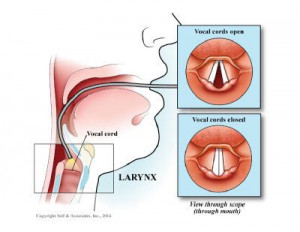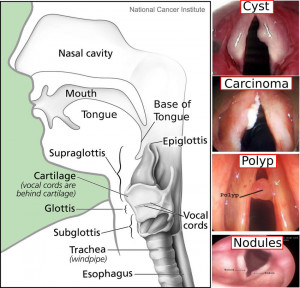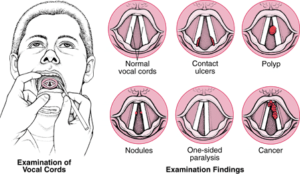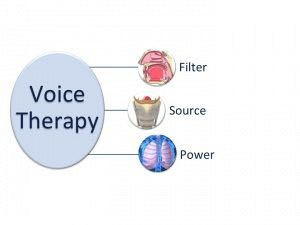
Do You Have a Voice Disorder?
Do You Have a Voice Disorder?
Do You Have a Voice disorder Problem?
Speech is the primary mode of communication for many people and therefore having a normal voice is critical for communicative efficiency.
Voice Production
The primary function of the larynx (a.k.a “voice box”) is biological in nature. It acts as a respiratory valve, protects the airways (vocal folds close during swallowing; eliminates food/water entering the lungs by the process of coughing), and helps build lung pressure during physical activity. Larynx sits on top of trachea and consists of vocal folds. The air expelled from the lungs set the vocal folds in vibration creating an acoustic energy, which we call as “voice”.
Different Voice Disorders
When the structure or function of the multiple systems responsible for voice production are affected, they result in perceptual changes commonly labeled as “dysphonia”. For example, voice may be too soft or sound breathy or may be tremulous. Disorders of the voice can be categorized as those that are caused due to inappropriate use (functional), that are due to some damage to the nervous system (neurological), that are due to lesions in/trauma to the laryngeal anatomy (structural), and that are due to infections (systemic).
Some examples of conditions that affect normal voice production:
-
Vocal Fold Nodules: Benign, bilateral localized growths on the vocal folds caused from vocal abuse and misuse behaviors. Voice could be hoarse and/or there may be breaks in voice.
-
Parkinson’s Disease: Neurodegenerative disease that primarily affects motor movements also affects speech and voice. For example, patients may have breathy voice and/or a voice that is too soft.
-
Laryngopharyngeal Reflux: Acid reflux is acid back-flow from the stomach into the esophagus. Long-standing reflux can cause irritation to the laryngeal structures resulting in hoarse voice.
-
Cancer: Laryngeal cancers can be benign or malignant and can occur at the level of vocal folds and above or below them. Depending on the tumor staging, voice symptoms can vary and may require customized treatment plan (e.g., radiotherapy to complete removal of the larynx).
Assessment of Voice Disorders
People experiencing any changes in their voice such as changes in voice quality (e.g., breathy), loudness levels (e.g., difficulty producing a loud voice), pitch levels (e.g., abnormally high/low pitch), tremors, increased effort to produce voice, increased fatigue after talking, pain, and frequent throat clearing/coughing for over a period of two weeks are recommended to visit a physician (ENT specialist) and speech-language pathologist (SLP).
Don’t ignore prolonged symptoms of heartburn or allergies. The role of an ENT specialist is to render medical diagnoses related to the identification of laryngeal pathology and to determine appropriate management strategies (e.g., surgery or referral for voice treatment).
The objective of an SLP is to assess voice production and its underlying physiological function and to determine how the voice disorder affects an individual in everyday situations, as well as to determine prognosis for change, provide recommendations for intervention and support, and recommend referrals where appropriate (American Speech and Hearing Association, 2004).
SLPs use a variety of subjective (e.g., observing tension; listening to the voice) and objective (e.g., recording voice and acoustic analysis) approaches to evaluate voice function.
Download our app to see if your child has a speech delay.
Treatment for Voice Disorders
Although a specific treatment plan will be formulated by your SLP, you can care for your voice by following some of these do’s and don’ts.
Voice disorder Problem,
|
DON’T Push your vocal system |
DOIdentify & Eliminate Vocally Demanding Behaviours |
|
Use non-vocal sounds (e.g., whistling), noise or instruments (e.g., clapping; blowing a horn) |
|
2) Avoid talking in noisy situations: over loud music: e.g., at noisy parties; in cars/ buses; over noisy machinery, heavy equipment, or motors, etc. Don’t talk over a long distance, especially outside. |
Adjust your environment as much as possible to reduce background noise. Position yourself as close as possible to people you are talking with, especially when there is competing noise. Always face the person(s) you are talking to.
|
|
3) Don’t try to lecture, or speak to large audiences without the aid of a microphone |
Use a microphone for public speaking Practice microphone technique: keep your voice relaxed, and at a comfortable level and let the microphone amplify your voice |
|
4) Don’t expose you voice to excessive pollution: cigarette smoke, chemical fumes, etc. – Avoid smoking. – Don’t drink alcohol excessively. – Avoid coffee, tea, sodas |
Drink plenty of water daily (64 oz) |
|
5) Don’t clear your throat frequently. |
Swallow slowly Drink water |
Limit amount of talking when you have a cold or feel tired. Be aware of your reflux symptoms and medications. Limit intake of spicy, acidic, and fatty foods and sleeping within 3 hours of eating dinner.
This article has been written by Dr. Supraja Anand, Assistant Professor, Communication Sciences and Disorders, University of South Florida, U.S.A.
Leave us a reply. Subscribe to our weekly tips here.
If you wish to know more about Speech Therapy, kindly contact us at info@1specialplace.com
For more ideas check out our other blogs
Voice disorder Problem
- Addressing the Silent Struggle in Special Needs Children - December 22, 2023
- Swallowing Difficulties: A Comprehensive Guide - December 12, 2023
- 6 Simple Steps to Enhance Speech Clarity and Connect with Confidence - November 3, 2023






Leave a Comment
(3 Comments)
Hello there
Please let me know what programs do you offer and how much they cost.
Thank you
Hi Hasen, you can check our services page https://1specialplace.com/services for all the details
Hello Hasen,
We offer assessment and therapy for all types of speech difficulties in children, adults and seniors.
You can call us on the contact number provided to discuss further. Regards
Categories
Recent Posts